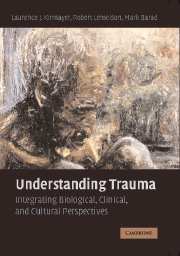Book contents
- Frontmatter
- Contents
- List of Figures
- List of Tables
- List of Contributors
- Foreword by Robert Jay Lifton
- Preface
- List of Abbreviations
- Introduction: Inscribing Trauma in Culture, Brain, and Body
- SECTION I NEUROBIOLOGICAL PERSPECTIVES ON TRAUMA
- SECTION II CLINICAL PERSPECTIVES ON TRAUMA
- SECTION III CULTURAL PERSPECTIVES ON TRAUMA
- Epilogue: Trauma and the Vicissitudes of Interdisciplinary Integration
- Glossary
- Index
SECTION II - CLINICAL PERSPECTIVES ON TRAUMA
Published online by Cambridge University Press: 27 July 2009
- Frontmatter
- Contents
- List of Figures
- List of Tables
- List of Contributors
- Foreword by Robert Jay Lifton
- Preface
- List of Abbreviations
- Introduction: Inscribing Trauma in Culture, Brain, and Body
- SECTION I NEUROBIOLOGICAL PERSPECTIVES ON TRAUMA
- SECTION II CLINICAL PERSPECTIVES ON TRAUMA
- SECTION III CULTURAL PERSPECTIVES ON TRAUMA
- Epilogue: Trauma and the Vicissitudes of Interdisciplinary Integration
- Glossary
- Index
Summary
Clinical issues and concerns about the suffering of individuals are central to the contributions in this section. Clinicians focus on symptoms and signs, which allow them to diagnose specific problems that, in turn, suggest interventions that can alleviate distress. Of course, any diagnosis captures only some elements of an individual's suffering, and clinicians usually work with more encompassing assessments and case formulations that include social or interpersonal problems and predicaments. Clinicians use these formulations to make sense of individuals' suffering and devise problem-solving interventions. Although in the past many clinicians adhered to a particular school of therapy, today a reasoned eclecticism is more common. Effectiveness is the final arbiter of clinical relevance – though judgments of good outcome raise many practical, epistemological, and sociomoral questions (Kirmayer, 2004).
Although much is known about effective interventions for trauma-related disorders, significant controversies and large areas of uncertainty remain (Bisson & Andrew, 2005). Some of the controversies, and much of the uncertainty, reflect the very different sorts of problems and predicaments gathered together under the rubrics of trauma and PTSD. These include disparate responses to events that vary in frequency, severity, and meaning. There are also enormous individual differences in the response to the same violent event, some of which is attributable to constitutional and genetic factors, early child socialization, and the age and developmental stage at which an individual experiences the trauma.
- Type
- Chapter
- Information
- Understanding TraumaIntegrating Biological, Clinical, and Cultural Perspectives, pp. 171 - 177Publisher: Cambridge University PressPrint publication year: 2007



